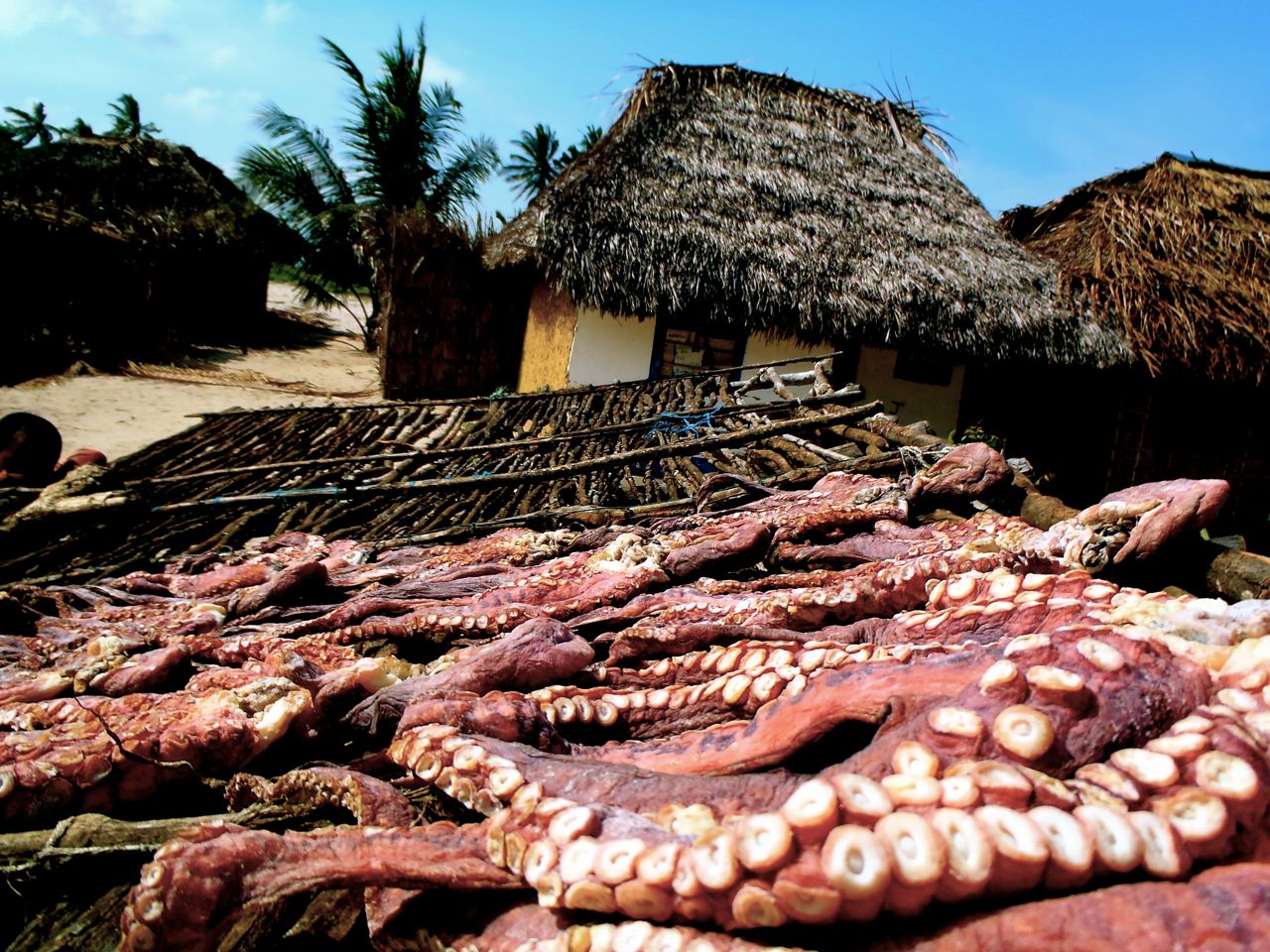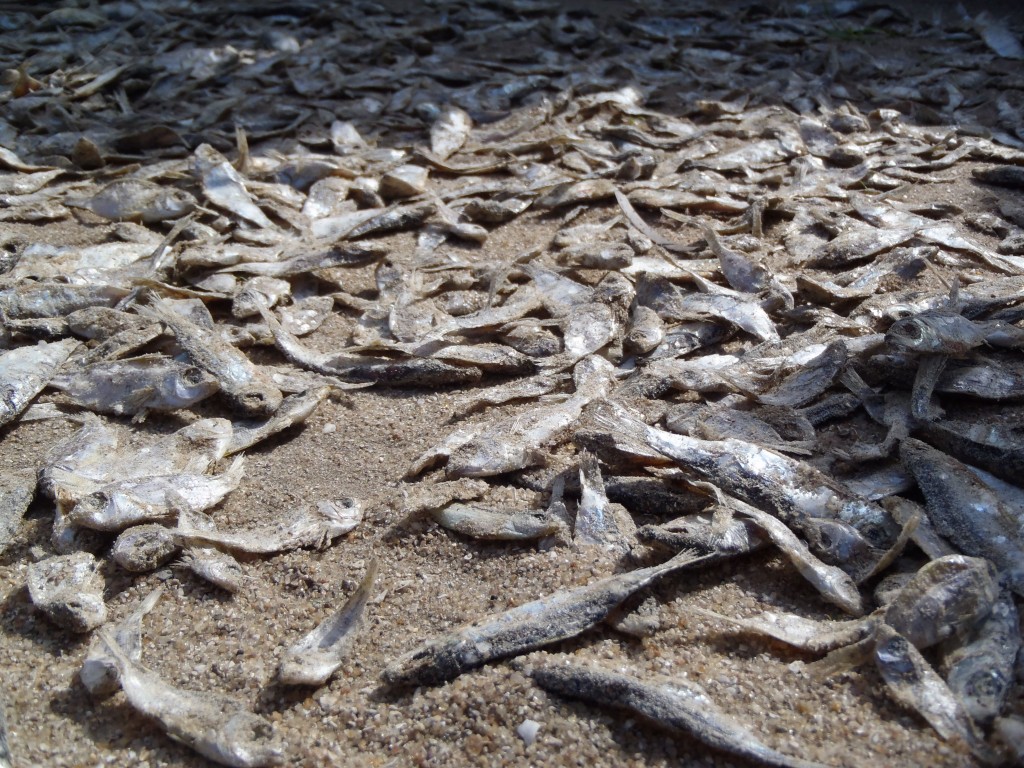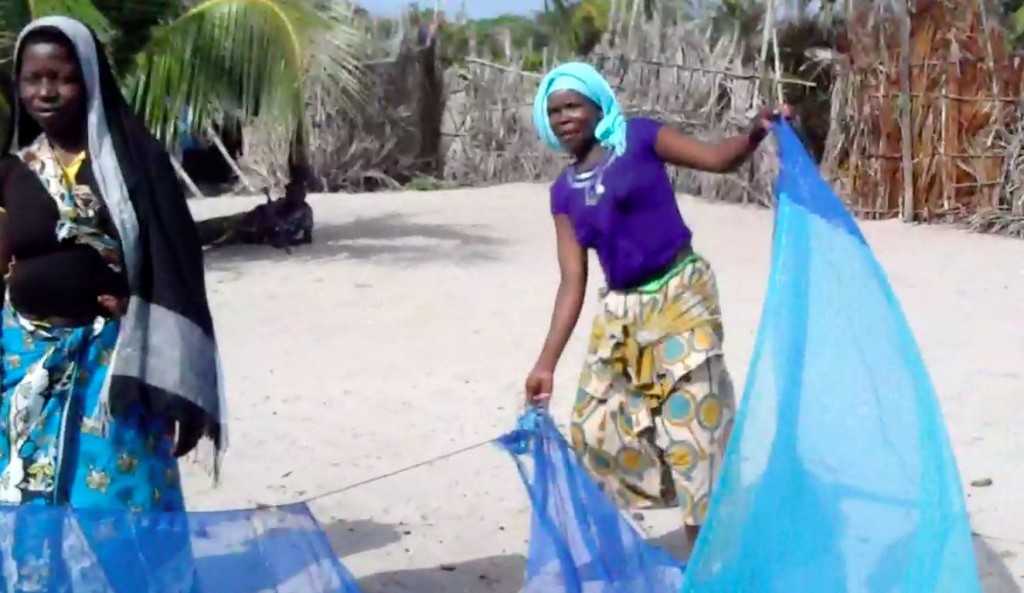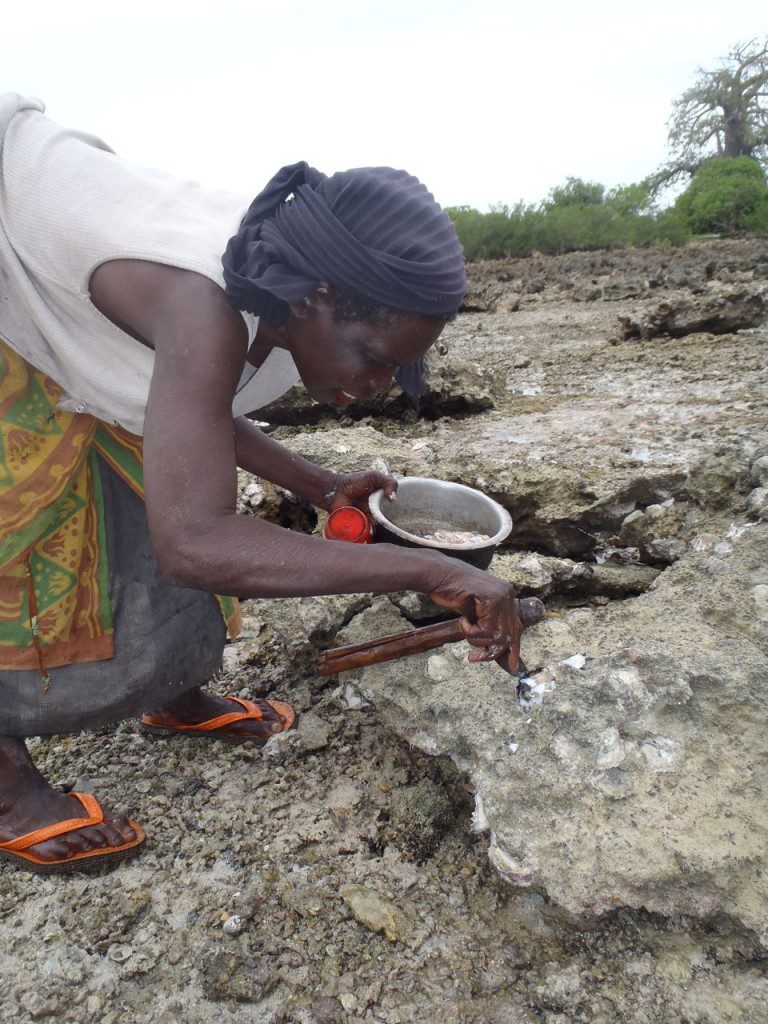The second update from my time in northern Mozambique, advising local NGO AMA and their Edinburgh-based partner Bioclimate on community-led octopus fishery management…
Walking around the small and quiet village of Quiwia with a group of fisherwomen, we see racks of drying octopus lying in the scorching midday sun.

Our guide, Tima Selemane, a local fisherwoman from Quiwia, explains the methods that they use for catching octopus. A metal bar or sometimes a knife is all that is required in this low-tech fishery. Tima shows us how they poke the bar into holes in the reef in search of octopus, and laughs as she theatrically demonstrates how an octopus will grab the metal bar (and often your hand if you’re not careful) with its spindly but super strong, sucker-filled arms. Women mostly glean octopus during spring tides when they can walk out onto the reef flats, but surprisingly in some villages such as Quiwia, there are women, like Tima, who will also dive for octopus, which is traditionally a male occupation.
According to the fishers and traders in the communities here, octopus catches are starting to decline. Ali Nuamede Saide, a fisherman from the neighbouring village of Quirindi, told us: “When I started fishing octopus over 30 years ago, I could catch up to 40kg in a day, now I am lucky to catch 15kg.” A trader from the same village confirmed that he has seen a similar decline in catches during the 10 years that he has been working in the village.
Back in Quiwia, we continue our stroll around the village with more and more women joining the throng. We notice a pile of small fish, mostly anchovy and sardine mixed in with some juvenile reef fish such as surgeons and snapper. “This is madada,” chime the women who are now about fifteen-strong, each with a young child or baby perched on their hip.

Madada
They point at a long swathe of mosquito net lying under a tree nearby: “This is what we use to catch these small fish,” they say, “we work in a team of three, one woman at each end of the net holding the rope with their hands and feet… and the third woman beating the water, chasing the shoal of fish into the net.”
In case we hadn’t understood the translation from our guide, the women jump into an impromptu display of how to fish for madada, laughing and whooping as they imagine catching a large shoal of fish.

“These mosquito nets are illegal in Mozambique, but women have few alternatives if they want to feed their families,” says Bioclimate’s gender specialist, Adaoma Wosu. “The intertidal fishery is vital to many women’s livelihoods and has a direct link to food security; women target octopus and small fish which they can sell, or pen shells, crabs and cockles for food.”
Fishing communities in Mozambique are some of the poorest in the world. Living hand-to-mouth, fishing households in coastal communities have limited ability to make savings and often have little consideration for the distant future, as filling their children’s bellies tomorrow is always at the forefront of their minds.
This is highlighted the next day as we walk out onto the reef flat and notice a woman collecting oysters for her family. It’s only as we continue walking up the beach that we notice that this area where she’s collecting the oyster is also used as the village toilet. A shocking reminder that there’s little else to sustain families here and that there’s an urgent need not only for fisheries management, but for integrated health and sanitation programmes as well.

So if unmarried or in a female-headed household, with only the intertidal zone to fill their stomachs, how do women access food when they cannot fish? And how do they find the capital to purchase the materials with which to fish?
The waters of the Mozambique channel are said to be shark-infested, but loan sharks operate in these waters too…
Sitting in Julho (an AMA technician)’s house, we’re confronted with the realities of being an octopus fisher in debt. We ask the trader-cum-money lender about how his business operates. He tells us that he has direct relationships with octopus fishers in the community, drawing up verbal contracts whereby he lends them money and in return they sell him their octopus.
And what if a fisher were to default on this loan? “I would simply go to his/her house and take their belongings,” says the loan shark. “It is understood and agreed in the contract beforehand, so there is no argument”.
This relationship can work when there’s mutual trust and respect between the lender and the fisher, but this situation is not ideal when people are reliant on borrowing money for many years. The trader tells us that of the eight people he started working with four years ago, he still does business with five.
“We want to break this cycle of poverty and indebtedness for some of the region’s most vulnerable women,” says Rachide Cachimo, AMA Coordinator for the “Our Sea, Our Life” project. “AMA and Bioclimate are working to develop savings and loans groups for women in these villages, and we hope that this will allow them to access some forms of capital that they didn’t have before, and break this reliance on local money lenders”.

Meeting with an existing women’s group (a ‘stick’ group – which is a type of group that puts their money in each month, and one member of the group receives it) on Quifuki
Photo credit: Mike Riddell, Bioclimate
Alongside these savings and loans groups, AMA and Bioclimate are looking at improving fisheries productivity and women’s livelihoods, hence my presence in the village. I’m advising them on how they might establish periodic octopus reserves with these communities, through a model that coastal villages in southwest Madagascar have been using for almost a decade, which we hope can be replicated by these communities in Mozambique.
“Women are the worst hit by declines in octopus populations as this fishery is one of only a few revenue-generating activities that they can take part in,” says Adaoma. “If fisheries management can help to maintain or even improve catches and income for these women, and they have the ability to save this money and invest it in local enterprises, they will increase their resilience and improve their food security.”
The project is still in its initial stages, but savings groups are already being started and the women we met seemed eager to get these going. Octopus monitoring is being set up by AMA technicians, and more is being discussed with these communities about the potential management strategies that exist for octopus fisheries.
This project is led by AMA and Bioclimate, and funded by the UK Department for International Development (DFID). Blue Ventures would like to thank staff from both organisations for their support and hospitality throughout the visit.

